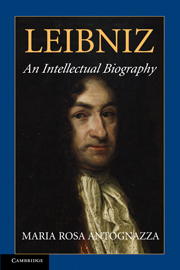Book contents
- Frontmatter
- Dedication
- Contents
- Acknowledgements
- Abbreviations
- Chronological Table
- Introduction
- PART I YOUTHFUL VOCATIONS (1646–1676)
- 1 The Birth of a Vision: Background, Childhood, and Education (July 1646–February 1667)
- 2 The Vision Broadens: Nuremberg, Frankfurt, and Mainz (March 1667–March 1672)
- 3 Old Wine in New Bottles: Paris, London, and Holland (March 1672–December 1676)
- PART II DREAMS AND REALITY (1676–1716)
- Appendix
- References
- Index
3 - Old Wine in New Bottles: Paris, London, and Holland (March 1672–December 1676)
Published online by Cambridge University Press: 05 September 2014
- Frontmatter
- Dedication
- Contents
- Acknowledgements
- Abbreviations
- Chronological Table
- Introduction
- PART I YOUTHFUL VOCATIONS (1646–1676)
- 1 The Birth of a Vision: Background, Childhood, and Education (July 1646–February 1667)
- 2 The Vision Broadens: Nuremberg, Frankfurt, and Mainz (March 1667–March 1672)
- 3 Old Wine in New Bottles: Paris, London, and Holland (March 1672–December 1676)
- PART II DREAMS AND REALITY (1676–1716)
- Appendix
- References
- Index
Summary
When leibniz arrived in Paris at the end of March 1672, the French capital was the most sophisticated and advanced centre of European culture. As part of the splendour and power of Louis XIV's monarchy, the French scientific, philosophical, and learned community counted many of the most prominent savants of the time. The young German, who had come to Paris with grandiose plans embracing the reform and advancement of the entire encyclopaedia of sciences for the improvement of the human condition, felt more than a little overwhelmed. As one might expect, it was the blossoming scientific and learned Parisian life and its innovative infrastructure that made the most powerful impression on Leibniz. In a report of 20 December 1672 to Johann Philipp von Schönborn he wrote with undisguised admiration,
The fellows of the Academy are people extremely learned in various fields who could compose an Encyclopaedia of arts and sciences; they meet twice a week (on Wednesdays and on Saturdays) at the Royal Library where some of them also live. Their secretary is Gallois, who also edits the so-called Journal des Sçavans. The king, however, has also had an observatory constructed on the outskirts of the city, in faubourg S. Jacques, which commoners originally mistook for a citadel; and here some of them, especially the astronomers, are going to live. Near the Royal Library is the garden and laboratory of the Academy; for several years they have grown here almost all botanic specimens and analyzed chemical elements. The Royal Library has more than 35,000 printed volumes and around 10,000 manuscripts.
- Type
- Chapter
- Information
- LeibnizAn Intellectual Biography, pp. 139 - 192Publisher: Cambridge University PressPrint publication year: 2008



